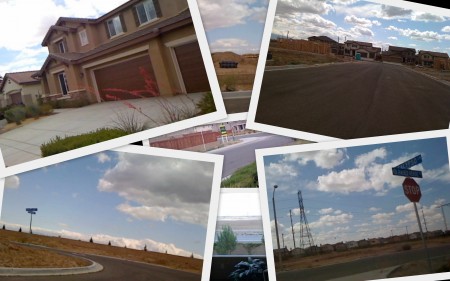
![]()
Everything the real estate industry tells you is a hustle. No industry is more geared toward pumping up the positive and burying anything remotely negative, leaving you — and truth — out in the cold.
The crash has not made real estate agents any more honest, but at least the gap between the industry’s crazed optimism and stark reality has grown so obvious that even the real estate industry can’t hide it anymore.
Nowhere is this more obvious than in Victorville, Calif., an exurb of Los Angeles situated in the high desert where housing bubbled up higher than just about anywhere at the peak of the subprime-lending craze and is still in free fall today.
These days, there are a lot of lies and broken dreams buried in the gravelly sand on which Victorville was built. During the last real estate boom, this barren wasteland was the mecca of low-income home ownership, proof that the American Dream was within reach of all.
Tract-home developers stripped away the rocks and tumbleweeds and Joshua trees, replacing them with mazes of curvy streets and cul-de-sacs with soothing names like Cottontail Drive, Steeplechase Road and Ladybird Lane, lining them with the cheapest McMansions in California. Things exploded out of control this past decade, with the population doubling to 100,000 in just eight years.
But that whole way of life is over now. Unemployment in Victorville is way above the national average, and violent crime has shot up. Homes prices have plunged to 1989 levels and many stand empty. Banks don’t even bother putting them on the market.
Yet, last week the press started hyping up the supposed real estate sales-driven economic turnaround that was about to sweep the country. “Honk if You Think It’s Over,” read a June 7 New York Times headline. “The panic in the Manhattan real estate market of the winter of 2009 lifted in the last few weeks, brokers say, as more and more buyers and sellers have found the courage and the comfort level to sign on the dotted line.”
The Washington Post went even further: “Economists, senior government officials and ordinary consumers are all showing greater confidence in the outlook for the economy. … There are unquestionable signs of economic progress.” ABC News went with a rhetorical structure: “Has the Recession Finally Ended? Strong Home Sales Are Just One Indicator That the Economy May Be on the Mend.”
From where I sit, this reads like pure fiction. It runs contrary to virtually every economic piece of data available: rising unemployment, growing credit card debt, a massive shadow inventory of foreclosed homes and a wave of defaulting ARM and commercial loans that’s just around the corner.
But there is something else, too. And it is as deadly to our vampiric debtor economy as a stake through the heart: the FHA loan. By guaranteeing certain mortgages, the Federal Housing Administration has been helping middle- and low-income Americans purchase their first homes ever since the 1930s. But this modest leg-up program has been been hijacked and transformed into the new subprime-loan market operated by lenders who are as corrupt, predatory and shortsighted as the original subprime lenders, and maybe even more so. Because this time taxpayers have been put on the hook for the risk well in advance. Real-estate insiders have been sounding the alarm about this new shadow subprime mortgage market — which is now almost $600 billion strong — for months now. But instead of listening, Congress has been trying to expand the FHA loan program.
Not surprisingly, it seems that risk-free loans are the only way banks can be persuaded to start lending again. But I wanted to find out firsthand how much of an impact these loans were having on the housing market. So last weekend, I shaved, put on a clean shirt and headed out for a day of shopping in Victorville.
Around here, it is much easier to shop for a brand new home than to find someone who will show you one of the many foreclosed ones. You don’t need to make an appointment with a real estate agent, hunt down open houses on a Sunday afternoon or attend auctions. All you have to do is take a drive any day of the week during normal business hours and look out for the huge signs plastered around town. They are not easy to miss.
It took me five minutes to spot a new development on the very edge of Victorville’s sprawl. The sign was dark green and advertised a development called “Braeburn at West Creek,” with luxurious and spacious homes offered for around $200,000. The development had a quiet, upper-class suburb feel to it: new cars, landscaped lawns, no traffic and wide streets. Passing a group of kids playing basketball in the middle of one of the streets, I pulled up in front of the Braeburn sales office, built into the garage of a model two-story McMansion painted a trendy brown.
It was 3 p.m. on Saturday, prime house-hunting time. With all this buying activity the industry was reporting, I half-expected to run into other bargain shoppers like myself. But I was the only customer in the real estate office.
“Hello! Have you come to see the houses?” a chipper female voice yelped from a distant corner of the office. “Give me a second, I’ll be right out.” I couldn’t get a visual on her. It was huge, this garage — er, office — big enough to hold three cars, easily the size of a decent apartment. Schematic drawings hung on the walls showing all the wonderful house configurations you could order.
That was when the voice appeared in human form: a blond middle-aged woman emerged from a corner office with a bundle of keys. Braeburn had three floor plans to choose from, she quickly started explaining. But I could only look at two of them. The third was still under construction. But if I wanted to, I could drive around and look at it: “It is quite far along in the building process.”
The homes were all quite similar: all three had two floors, four to five bedrooms and range of 2,454 to 2,765 square feet. All of them had what’s called a “great room,” something you see in new home developments that combines the kitchen, living and dining rooms into one great open space.
“We have sold 105 homes so far, and I have about 30 homes left,” the agent said, whipping out a photocopy list of Braeburn’s homes, complete with lot numbers. “Right now we are headed into this cul-de-sac. This is our last cul-de-sac.” The rest of the homes would be built on mere streets. She circled homes numbered 85 through 98 surrounding a dead-end street called Window Rock Court.
Read more: federal housing administration, fha loan, inflating, real estate bubble, scam, subprime, subprime loan, victorville, Yasha Levine, Banking Porn, eXiled Alert!


Got something to say to us? Then send us a letter.
Want us to stick around? Donate to The eXiled.
Twitter twerps can follow us at twitter.com/exiledonline















17 Comments
Add your own1. Scott Brown | June 16th, 2009 at 8:24 am
Great story, it seems as just more dithering as we move closer to financial collapse. The next step is when millions of homeowners just decide to not make another payment, even if they can afford to.
The politicians just have to keep lying to us and encouraging everyone to get up early, work a little harder and everything will be all right, since they won’t do anything that can make a real difference to anyone other than their buddies.
This isn’t a recession or even a depression, this is a national disaster.
This is a Category 5 economic storm.
The dikes have broken, the Super Dome is overflowing, people are without food and water–people are desperate and government is doing a GWB style “fly-over” at 40,000 feet.
We need to keep people in their homes, declare a moratorium on foreclosures, and stop singing in the glee club with all Washington DC’s Wall Street cronies.
The FHA program is just another phony attempt to send the message that “we have a plan and we are rolling it out,” when in fact the “fly-bye” is the plan.
2. rick | June 16th, 2009 at 2:11 pm
Fuck. I didn’t know about this. Good scoop. It’s the monopoly money phantom-bloat home prices that fundamentally caused the crisis and bailouts, isn’t it? The money never existed. Home-buyers are quanitatively-retarded Americans. The housing bubble has to be allowed to implode.
http://bit.ly/3Tv7KX
According to Taleb, nearly all economic “experts” are utterly full of shit incompetents. He’s not even political about it, which I respect. He’s a convincing guy, too. We live in interesting times!
3. az | June 16th, 2009 at 2:15 pm
Something to think about when reading things like http://news.bbc.co.uk/2/hi/business/8104066.stm haha.
4. Expat in BY | June 16th, 2009 at 2:49 pm
So if I got it correct, this is what the Consumer Financial Protection Agency is supposed to protect against, and the CFPA is going to come up way late and way short of the mark.
Probably stating the obvious here, but on the consumer end, it seems like if you didn’t really care about their credit history (or the effect on the overall economy), you could “buy” a home beyond your means, live in it awhile, and then walk away from it when the bills started to get overwhelming.
I think I’ll stay overseas…
5. Homer Erotic | June 16th, 2009 at 3:40 pm
So where exactly is the State of California getting the money to fund this madness? Aren’t they on the verge of budget collapse?
6. Tommy Strange | June 16th, 2009 at 7:43 pm
Yasha, the overall article was great. It’s an engaging first person educated look at how ‘the experts’ are pushing us to a depression even faster. I just have two problems with what may seem minor points. Though the first is very important, and an example of the lack of education , (economic, class, and racial) that so many americans need. Please consider my post….
“FHA loans have been around since the Great Depression, helping working-class Americans buy their first homes by providing government insurance that guarantees certain types of loans at no risk to the lender. Until recently, they have been largely a force for good. During the civil rights movement, for example, FHA loans were retooled to help African Americans purchase homes. But like most public programs designed to help the American people, the FHA has been hijacked by big business — in this case, the banking and real estate industries. ”
Actually the FHA, though on the surface sounds like a good program since the depression, preceded by HOLC, was actually a gov’t funded white only(99%) exodus from the cities and a resultant defunding of the cities via lost tax base and to make a white working class feeling ‘middle class’ who would never then vote for rebuilding cities, and the precursor to the housing bubble we have now. The environmental aspects of such foolish funding I won’t go into to. But FHA loans from FDR up until the late 60’s were predicated on suburban development almost exclusively to not only benefit corporations that were rightfully fearful (from their perspective of unions finally allowing blacks in), in the cities,and huge real estate developers benefiting from highway construction. The FHA from the beginning has been FOR the banking and FIRE sector. Blacks and Jews were not allowed these loans. It was not a conspiracy. It was very upfront. There were rates of A to D of every urban area in the country made under FDR…and this continued up into the 60’s. IF you wanted to re do your ‘urban house’, or ‘move up’ across the street, but had blacks on your block, no loan…UNLESS you would move to a suburb.And lets repeat. Black families did not get these loans until the late 60’s. That’s 25 years of white only suburbanization, with the concomitant union racism, housing segregation and political and economic disenfranchisement that existed.
If you actually wanted to stay in an urban area, and you were white, but ONE black and ONE jewish family lived there , you get a low rating and have to move to the suburbs for a loan.If you read the commits of politicians during these times, you will see it was a very stated tactic to segregate people of color and give whites wealth, and a stake in siding with increased segregated class and race real estate development.Mike Davis portrays this in two of his best books.
this is well documented in many urban studies texts, and on many blogs, and in many articles. Two essential books, even used in many university courses are “Crabgrass Frontier” by jackson and “Urban Crisis: Postwar Detroit” by sugree.
The other comment you made , is a minor bug up my butt…
“The second contraction will come, and when it does, it’ll be bigger and badder than ever. And the government bailout will come straight out of our pensions and health care.”
You must be upper middle class to make such a statement. Not that is a bad thing. Certainly looking at your humanist writing wouldn’t make me think so. But the bottom half of this country does not have pensions(!) nor much health care. Think about that. You wrote about worrying about pensions in an article attacking the investment class, when half the population in the richest country in the world does not even know what the fuck a pension even is. The boot is hitting the working class hard already.Even in ‘progressive’ San Francisco, thousands of nurses and social workers and etc have been cut, while they increase regressive taxes. Near 6,000 needy and addicts may lose support in one clinic alone.And as hundreds of thousands of foreclosed unemployed come into the cities for help? The same people that thought they were so special living in cul de sacs and suburban homes, that voted for more prisons, more tax cutting, more FHA type morgtage subsidizing while manufacturing was outsourced?
I am hardly worrying about your pensions.
good article though. Please reply. i am putting out a free newspaper in SF and will except part of your article.
A dialogue would be great.
7. Tommy Strange | June 16th, 2009 at 7:57 pm
“except part of your article”.
sorry I mean ‘excerpt’. I meant quote. cuz it is a great article!!!!
8. mmmm | June 17th, 2009 at 12:04 am
Wow, I really wish there was some way to divorce middle and lower-income Americans from their ubiquitous homer-ownership fetish.
Get people into largish, even luxurious apartments/flats and get the requisite car ownership out of the equation (they do rent those things, you know) and all of a sudden, people aren’t so cash poor anymore…
…but I understand this is a batshit, lunatic fringe position. We’re just going to have to meekly accept and brace for the next big contraction, because simply stepping out of the way would be *crazy*! I mean, honestly, no house? Our broke-ass friends would all laugh at us! Mommy and daddy would disapprove!
9. Mark | June 17th, 2009 at 5:07 am
Yeah, middle class people have an unkillable house fetish. When I hung around with upper-middle class people, I was under no pressure to own a house. They were always doing things outside their houses. Then when I got my middle-class girlfriend, it was house house house house house….
10. az | June 17th, 2009 at 7:56 am
@8: That’s what those on the so called ‘loony left’ apparently want to do. I remember reading a Freeper discussion of how Tysons Corner in Northern VA is going to be turned into a mixed-use area instead of being an enormous parking lot the government can’t afford anymore and that apparently what is actually going on is that the liberals want to put everyone into cattle cars to live in ghettoes. Otherwise read Tommy’s comment.
11. Chris | June 17th, 2009 at 11:53 am
That’s great Yasha.
BTW, where the fuck is War Nerd on Iran?
I’m pissed and I’m like Francis Bacon: I would like to suck his cock.
12. Simon | June 17th, 2009 at 3:38 pm
To pay off the existing debt, new debtors have to be found, that is the way the money and banking system works. Problem is we have run out of new people prepared to take on more debt and existing debtors have had enough. Time to create debt free money, not allow the banks to create yet more debt money.
13. az | June 18th, 2009 at 12:54 pm
Simon: This has happened since before capitalism even existed and money was just a weight of precious metal. People work for a wage, need money before they get the wage, spend it, get the wage, repay the debt with interest, take out another debt as they have no money again, etc. The lender-debtor employment system eventually collapsed because the debtors were financially ruined and could no longer afford to buy the goods they made for the lender, from the lender. This led to the systems of slavery we know of so well in the age of antiquity. What’s different today is that slavery and serfdom are outdated systems and while employment is the latest and most efficient one, it has also befallen the fate of falling profits and the introduction of credit to make up for that. Except credit is tied to capital both when it is given out and when it’s spent.
14. az | June 18th, 2009 at 12:55 pm
Or just read the chapters on money and banking in Capital by Marx, it’s all right there.
15. Dammerung | June 18th, 2009 at 6:51 pm
Yasha Levine for Secretary of the Treasury and Peter Schiff for Chairman of the Federal Reserve. The government is killing the goose that laid the golden egg – US! THE TAXPAYERS!
16. Frank McG | June 25th, 2009 at 3:17 am
I think I need to go watch Glengarry Glenn Ross again.
17. Mike Gogulski | July 19th, 2009 at 11:58 am
Nothing surprises me anymore.
America, fuck yeah (faceplant in peanuts and beer detritus on bar)
Leave a Comment
(Open to all. Comments can and will be censored at whim and without warning.)
Subscribe to the comments via RSS Feed